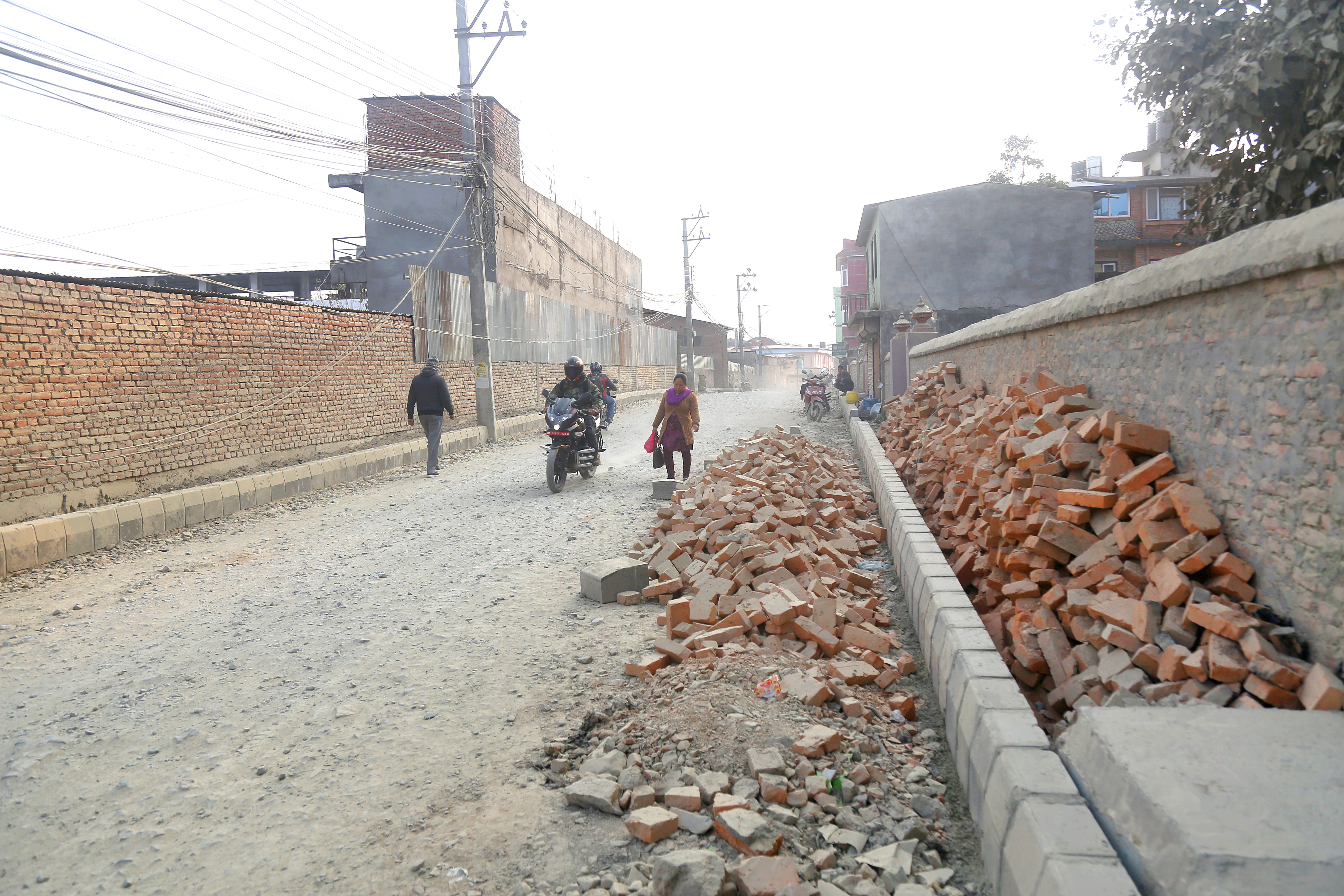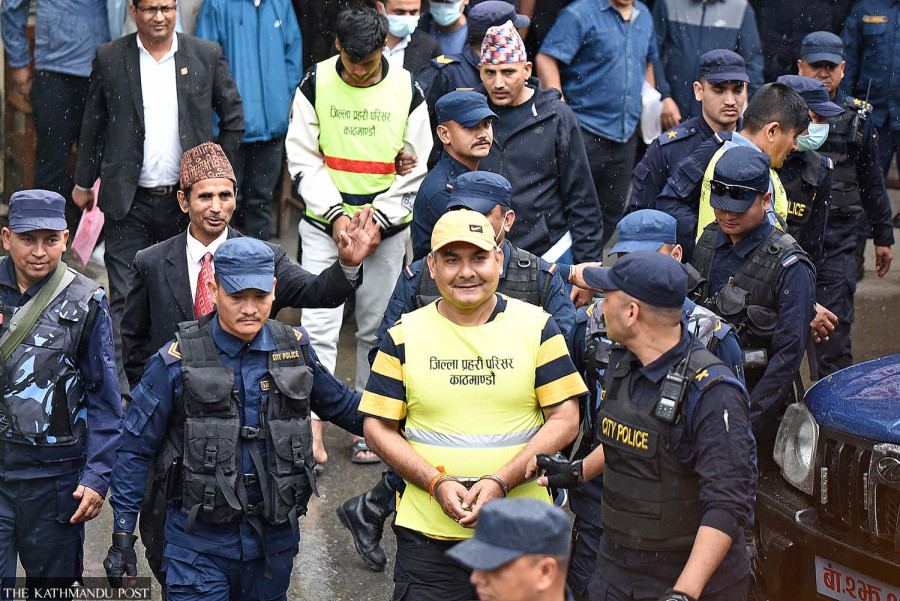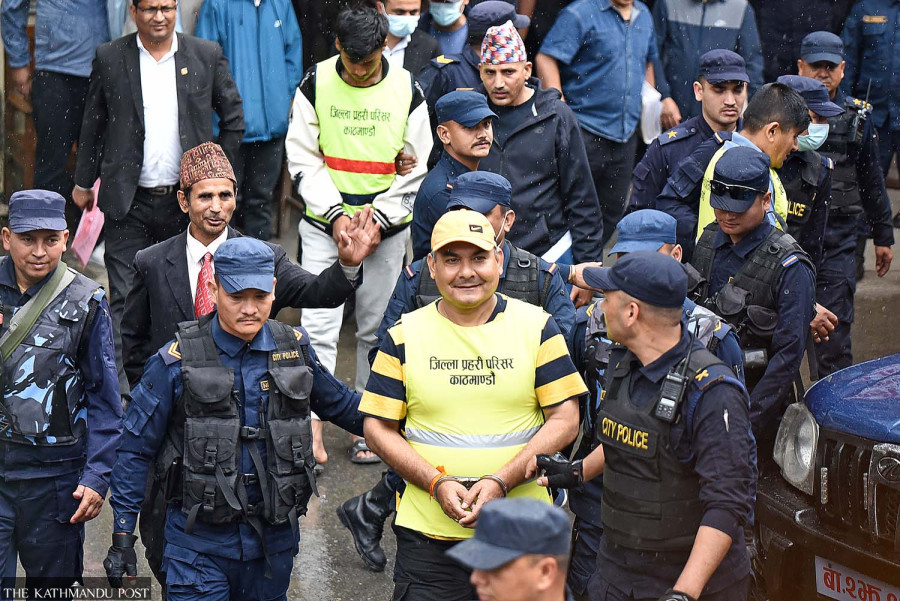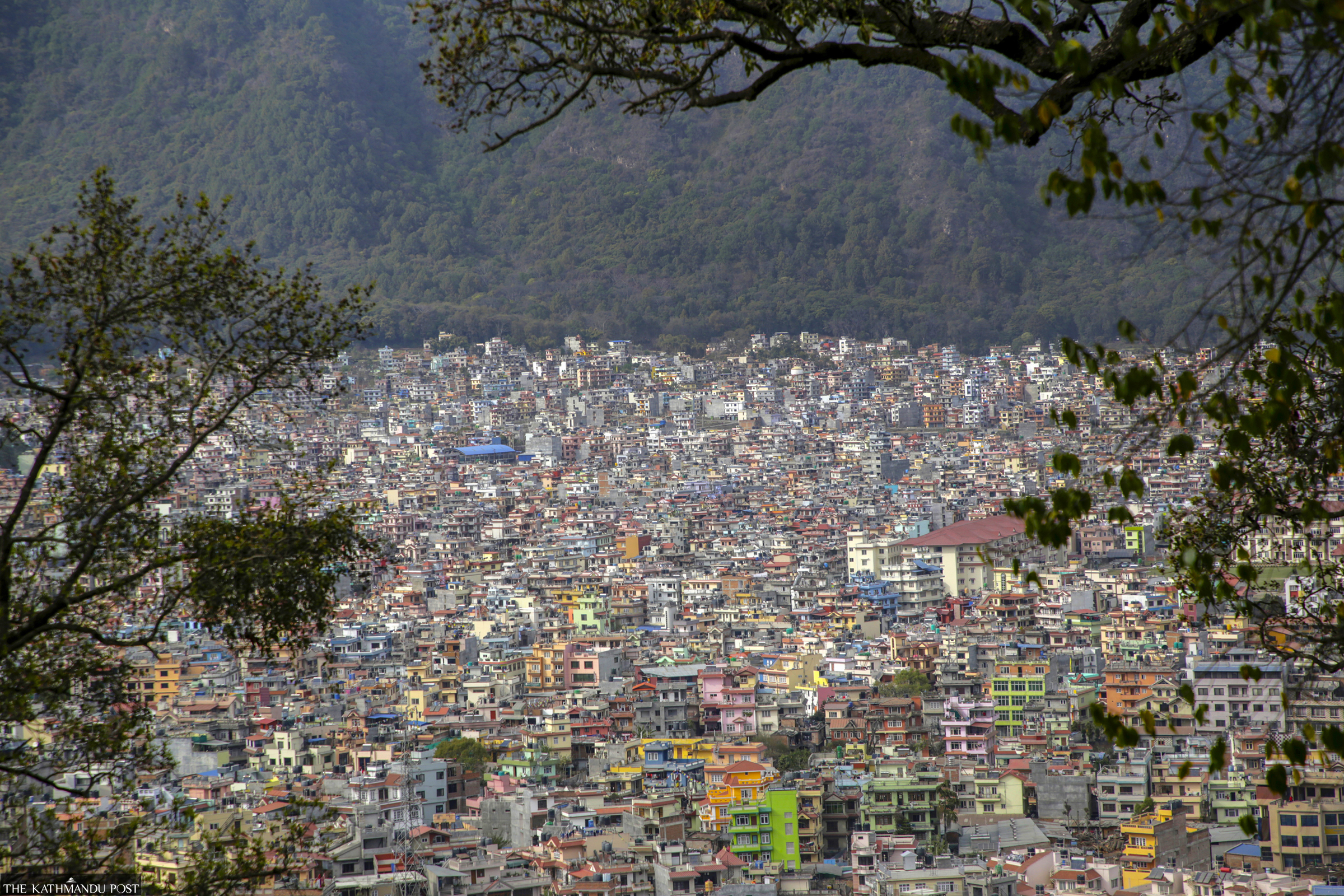Valley
Roads to nowhere
Shailung Construction holds contracts for the maintenance of many roads in Kathmandu Valley. Its performance on all of them has been found wanting.
Prithvi Man Shrestha
Until two-and-a-half years ago, the Akasedhara-Ram Mandir section in Kapan was a narrow stretch of road, but at least it was blacktopped. Area residents were satisfied with the road, as it served them well, posing no significant problems.
Two years ago, however, as part of the Department of Roads’ expansion project, the blacktop was removed to widen the road and install a new drainage system. A perfectly decent road was dug up for expansion and a year-and-a-half later, the road has neither been widened nor the drainage system installed. It remains a dirty, troublesome stretch that becomes muddy with the rain and dusty with the winter.
“Past monsoon, we could not walk on the road due to the mud and had to use a longer road to get to Chabahil,” said Rajeshwor Tiwari, a Ram Mandir resident who runs a school. “Now, we face problems due to dust.”
According to the Department of Roads, the contractor is still carrying out works related to laying curbs and pipe. Both locals and department officials say that there is no issue related to right of way clearance, but construction work has stalled.
The company responsible for building the 1.2 km section of road is Shailung Construction, which has been in the business for more than a decade. In recent years, the contracting company has been better identified with its owner Sharada Prasad Adhikari, who is the landlord of former prime minister and Nepal Communist Party (NCP) Co-chair Pushpa Kamal Dahal.
Today, Shailung Construction holds contracts for over half a dozen road stretches inside Kathmandu Valley, including in the project improving 48 kilometres of roads dug up by the Melamchi Water Supply Project--in Kathmandu and Lalitpur. None of the projects has seen any significant progress so far.

In the spotlight

Shailung Construction owner Adhikari first came into the spotlight in December 2016, when Dahal, the former Maoist leader, shifted to a house owned by Adhikari in Khumaltar, Lalitpur. The relationship between the two came to the fore last year when reports showed that progress on most of the projects being handled by Shailung was poor, especially at a time when the government was taking police action against errant contractors.
Friends and construction businessmen who know Adhikari say he rose from humble beginnings to become an ‘A’ class contractor with an annual turnover of around Rs800 million. Although many observers credit his exponential rise to his political connections, Shailung director Ramesh Subedi says the business has been “gradually” rising since the 90s.
“It is true that relations between Dahal and Adhikari have remained good, but not due to business interests,” Subedi told the Post. “It’s because they share a long history of political relations.”
Subedi said Adhikari supported Dahal’s Maoist party since its early years during the insurgency. Even at the height of the conflict, when Dahal was wanted by Nepali authorities, Adhikari did not hesitate to assist Dahal--and the Maoists--by taking personal risks, said Subedi.
Born and raised in Nuwakot, Adhikari started on his business career with a computer institute in the early 1990s in Kathmandu before launching a trading business. But it wasn’t until 2004 that Adhikari entered the construction industry--first as a 'B' class contractor. He engaged in small-scale work, setting up electricity poles, wires and transformers. During that time, Shailung only took up contracts worth around Rs20 million.
Around 2009, less than a year after Dahal became prime minister following the peace agreement between the Maoists and the government, Shailung was upgraded to an ‘A’ class contractor. The company started taking up contracts that year for roads on a small scale, gradually setting its eyes on larger projects, including major road construction works inside Kathmandu Valley.
The contract for the Sattale-Akasedhara-Baluwakhani-Sundarwasti road was awarded to Shailung on June 5, 2016--when Dahal’s party was backing the government led by KP Sharma Oli. Shailung then bagged the contract for the Akasedhara-Ram Mandir Road the following month, two days after Oli resigned and it was all but clear that Dahal would become the new prime minister.
Less than six months after Dahal came to power, the road improvement project for the Valley after Melamchi dug up roads was given to the Citel-Shailung Joint Venture in January 2017.
According to Tanka Chaulagain, a contractor who has had a long and close relationship with the Shailung owner, Adhikari was also involved in purchasing and delivering logistical equipment, including communication gadgets, to the Maoist rebels during the conflict era.
Chaulagain was associated with Janamorcha Nepal, then led by Amik Sherchan, which later merged with the Maoist party after the former rebels entered into the peace agreement. He told the Post that Adhikari was close to the Maoists because some of his relatives were involved in the insurgency, while a few of them were also killed at the hands of the state security forces.
Kapil Bhatta, secretary of the Netra Bikram Chand-led Nepal Communist Party Gorkha district committee, who was a close colleague of Adhikari, told the Post that a central member of the Maoist party familiar with Dahal told him that the chairman had warned Home Minister Ram Bahadur Thapa to stop legal action against contractors.
“It is clear that Dahal is behind the contracts being awarded to Adhikari and the chairman has been shielding actions against guilty contractors,” Bhatta said.
In an interview with BBC Nepali Service late last year, Dahal was asked about Adhikari and the controversies surrounding Shailung’s delayed projects. Dahal defended Adhikari saying he was not as controversial as he had been made out to be.
“What is controversial, why is [he] controversial, what has happened to him to become a controversial figure? Is there any case against him? Should anybody who has relations with [me] be called controversial? This is a big disease,” an animated Dahal told the BBC.

Similar stories across the Valley
The status of incomplete construction works can be seen in most projects awarded to Shailung Construction. The company was awarded the contract to expand the 3.85km Sattale-Akasedhara-Baluwakhani-Sundarwasti road on June 5, 2016 for Rs203 million. But until the end of November, more than two years later, only half a kilometre of road had been blacktopped.
According to the Road Department, the work should have been completed by June last year. “But construction is moving very slowly as the contractor has failed to mobilise both adequate equipment and manpower,” said Ram Bahadur Gurung, a government official who was tasked with overseeing this road project. “The contractor mobilises its manpower for 2 to 4 days and then disappears from the site. In fact, the contractor has one small team that makes the rounds to several projects, instead of dedicating a separate team to each project.”
Shailung Construction, however, blames the delay on a failure to clear the right of way. A right of way is the government’s discretion to clear houses or any other infrastructure or objects that hinder construction.
“Many houses in Baluwakhani and some other areas were cleared later than they should have been,” said Shailung Director Subedi. “Near Sattale, there are still four-five houses that need to be removed.” The contractor further blamed a failure to ready the outlets of drainage pipes for the delay.
At Akasedhara, this delay in completing the road construction has hit Ganga Shrestha, who runs a utensil shop, hard. “During the four-month rainy season, people could not come to my shop due to the muddy road,” said Shrestha.
Shrestha also said he was suffering from allergies for nearly every month, which he blames on the dusty road.
About a year ago, a short section of the road at Baluwakhani was gravelled, but local residents say they haven’t seen the movement of any construction equipment since February last year.
“Had the project been implemented as committed, this road should have been completed by December 2018,” said Hari Thapa, a resident of Baluwakhani, who owns a hardware shop.
Local leaders, including Gagan Thapa and Kusum Karki, have led locals multiple times to the Kathmandu Division Road Office-1 at Minbhawan demanding the completion of the project. "The Road Office committed to completing the project at the earliest during our visits, but all have proved to be just lip service so far," Thapa said.
Not all to blame
When a section of the road from Kalanki to Dhunge Adda was blacktopped at the end of November, Madhav Prasad Regmi, a grocery shop owner, felt that his personal hell would finally come to an end.
Ever since Regmi opened the shop four years ago, he has been forced to live in the mud and dust, leading to health problems like recurrent colds and chest pains. “I close the shop for around two months every year just to save myself from the dust,” Regmi said.
Dinesh Khadga, who owns a carpet store at Tinthana, has the same story. Like Regmi, he had opened his store four years ago and had been living in a cloud of dust.
“Had I known that the road expansion would take so long, I would not have started a business here,” said Khadga.
The Nagdhunga-Kalanki stretch is one of the busiest roads in the country, as it is the gateway to Kathmandu. Dust and sound pollution have long been problems for residents. The delay in road improvements only aggravated the situation.
The last few months saw a flurry of activity from the contractor. Although the 9km stretch of Kalanki-Nagdhunga Road, which was awarded to a joint venture involving Shailung Construction in 2015, should have been completed by January last year, the deadline has now been extended until the end of this month. The Road Department says the company has finished only about 70 percent of work so far.
The delays, however, were not entirely Shailung’s fault. Across the Valley, there was significant obstruction from local residents demanding compensation for the land acquired. Furthermore, the Supreme Court’s interim order in August 2016 to halt expansion works and its subsequent order in June 2017 to compensate locals for the acquired land, coupled with delays in clearing telephone and electricity poles and removing trees, had forced Shailung to put off some of its work.
To its credit, Shailung has also managed to complete most of the road maintenance work created by the Melamchi Water Supply Project. According to Gurung, a former spokesperson for the Kathmandu Road Division Office-1, almost all of the work handed over to the contractor for maintenance has been completed.
The maintenance of nearly 10 km of roads handed over to the Division Road Office by the Melamchi Project has been completed. However, Melamchi has so far handed over only about 12km out of a total 48.1km to the Road Office.
Road Department officials blame the delays on the tendency of contractors to take up a large number of projects without adequate capacity to complete them, particularly in case of companies like Pappu and Shailung.
“The company took up too many projects in a short period, beyond its capacity. It failed to implement any of them properly,” said Gurung, the official tasked with overseeing the Sattale-Akasedhara-Baluwakhani- Sundarwasti road.

Two roads
Nearly five years ago, Shailung was awarded contracts for two road projects being undertaken under India's Line of Credit, extended through the Export Import Bank of India. One was the 16km Kamalbinayak-Nagarkot road, awarded in June 2014 to a joint venture involving Shailung and AIPL Construction (India) for Rs340 million. The other was the 17.1 km Mutku-Ranipauwa Road on the outskirts of Balaju, also awarded in June 2014, for Rs310 million. Both these roads are being upgraded under the Road Improvement Project of the Roads Department.
The extended deadline for the Kamalbinayak-Nagarkot Road expired in June 2018 but only 50 percent of the work has been completed so far, according to a senior project official. Shailung is being fined around Rs150,000 every day, the project official told the Post. “We had fined them around Rs700,000 while clearing the first bill the contractor had submitted,” said the official.
The government can fine Shailung for 210 days, up to 10 percent of the project cost.
Shailung, meanwhile, claims that it has completed conducting a ‘trial blacktopping’ of one kilometre road, prepared a base in three kilometres and cleared the surface in around eight kilometres. The contractor further said that the construction work had been affected by the government's delay in making extra payments after the variation order--which is when construction works not originally planned are undertaken--a delay in cutting down trees, and repeated obstructions by locals demanding that side walls be constructed higher than what the contract allows.
While it is true that the project faced obstructions due to delays in obtaining clearance to cut down trees and remove electricity poles and other utility services, project officials say that the deadline was extended to compensate for these days.
Furthermore, the Roads Department has been fining Shailung for delays in the Mutku-Ranipauwa road. Since April, the contractor has been fined Rs155,000 a day, totalling Rs1.86 million. The road widening was supposed to have been completed by June 2016, but so far, only 42 percent work is over.
“Although several factors delayed the completion of work, the contractor was fined for not working even in areas where there was no obstruction," said Niraj Sharma, the project chief. "We have issued a notice in the name of contractor demanding an explanation as to why the contract should not be terminated."
From the very beginning, this road project has faced various hurdles. First, India's Exim Bank, which is funding the project, delayed providing a green light after the contract was awarded. While the contractor was transporting machinery and equipment to the site, the 2015 earthquake hit. The situation was further aggravated by the subsequent Indian blockade, according to project officials.
The deadlines for four more Kathmandu road projects that Shailung is handling have expired, according to the department. These include the Sundarwasti-Adarsanagar-Chunikhel-Tupek-Tusal-Jagadol Road; Buddhanagar-Ratna Rajya School-Pandeshwor Marga Road; and Kathmandu Metropolitan City-Ward No 16 Office-Boratar-Banasthali Road. In a recent report, the Road Department rated the progress on all of these projects as “poor”.
However, Shailung Director Subedi said construction works in the case of the Kalanki-Nagdhunga section would be completed before the fiscal year ends in mid-July, and almost all of the roads in Kathmandu would be completed by this summer.
“We will complete the work,” Subedi, the company’s director, said. “It has been an issue of pride for our company as we have been unjustly made a scapegoat for the delays.”




 8.4°C Kathmandu
8.4°C Kathmandu





